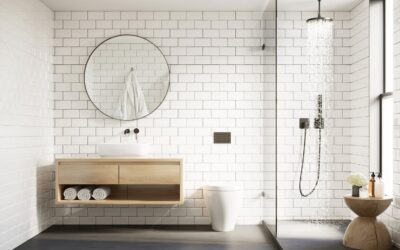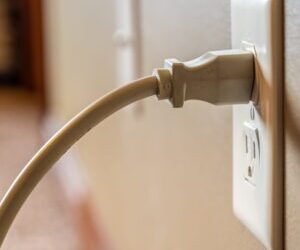In recent years, vinyl has emerged as one of the most popular materials for home renovation and remodeling. It’s affordable, can simulate the look of wood, and it’s durable enough to last for decades with minimal maintenance.
If you are planning a budget renovation or simply want something affordable so that you can splash out in other areas, vinyl should be a top consideration.
Explore the pros and cons of vinyl materials and find out whether this is the right choice for your next project.
Vinyl Flooring for Any Room in the Home
Throughout our complete home renovation and remodeling coverage, we’ve had the chance to talk about some of the best flooring materials. Vinyl is one of our recommendations for affordable kitchen and bathroom remodeling.
While vinyl is most popular in moisture-prone areas, it can work throughout the home. Living areas, entryways, laundry rooms, and even bedrooms are suitable for flooring installation.
Flooring is one of the most important features in your home. Because it is immediately noticeable, it can set the tone of a room. Flooring planks are available in a range of different colors and designs, allowing you to achieve the perfect custom aesthetic. Is impervious to water and humidity, so it’s ideal for kitchens and bathrooms. Flooring can last for 25 years or even longer if you choose luxury planks.
The only downside is that vinyl can be scraped or gouged with heavy objects. Appliances and furniture could damage vinyl when left in place for years at a time. Outside of this, it would be a great choice for your flooring.
Low quality vinyl planks can take on a yellowed appearance over time, so if you are replacing your floor, insist on luxury options. They cost slightly more than entry-level vinyl but are still cost competitive with more traditional materials.
Vinyl Doors for Home Renovation
Interior doors can have a big impact on how your home looks and feels. Because they don’t need to withstand any major stresses, it’s often a good idea to go for something affordable like vinyl.
Home renovation with vinyl doors will give you access to countless designs that can complement the rest of your home. It’s even possible to get doors that perfectly match your interior wall paneling, creating a uniform aesthetic.
Vinyl doors can help to insulate a room, so it’s possible to reduce heating and cooling costs. They could also help with sound dampening, which is important if you have kids or teenagers at home.
Unless you want the absolute authentic look and feel of natural wood, vinyl is the best choice for interior doors. You could install them during your home renovation now and enjoy a long return on your investment. Vinyl interior doors could last thirty years or more.
Vinyl doors are relatively lightweight and easy to hang, so you could even perform DIY replacements. Or, you could call a Des Moines handyman to install new doors for a relatively low cost.
You can also use vinyl for your front door and secondary access doors. Products designed for main entryways use heavier grade vinyl that is perfect for security and insulation against the elements.
Vinyl Garage Doors Pros and Cons
If you are replacing a garage door as part of your home remodeling project, vinyl is worth considering. It’s a particularly useful material for double garage doors, thanks to its low weight. It is impact resistant and can be factory colored to match your home exterior features. Because of its weight, it’s relatively quick and easy to install. This could keep your project costs down.
Vinyl is a great insulator and is much more efficient than steel or aluminum garage doors. If you have a finished or semi-finished garage, this material will keep your cooling and heating costs down.
The advantages are shared by most vinyl products…
- Pricing is competitive with other materials and usually lower than steel, aluminum, and wood.
- The aesthetic is highly customizable, allowing you to have a unique garage door made to your specification.
- Maintenance is virtually non-existent. Regular cleaning will keep the material looking great.
- Vinyl won’t rust, rot, bend, or warp. Garage doors are subjected to constant stress. Is an ideal solution.
The only real con or downside to vinyl is its lack of customization once it’s installed. Unlike wood, you won’t be able to repaint vinyl. The color is impregnated into the resin at the factory. This means that you will eventually need to swap the door out if you want to perform a major home remodeling makeover in the future.
Considering there’s only one real downside, it could be the ideal choice for your next project.
Vinyl Siding for a Durable and Affordable Exterior
If you are planning a home addition, or a complete re-cladding, vinyl is one of the best options to consider. It’s usually more affordable than aluminum and wood, and much more affordable than high-labor materials like stucco or masonry.
By saving money, you could have more in your budget for interior improvements like kitchen appliances, cabinets, or even smaller items like light fixtures and luxury molding/baseboards.
Besides the cost, the biggest advantage of using vinyl outdoors is its durability. It won’t be impacted by humidity or pollutants in the air. It will hold up to heavy rain, snow, wind, sunlight, and even hail. It can’t rot or chip, and it won’t warp like wood.
Vinyl is extremely resilient against impact damage, so flying debris in a storm won’t be a concern. When it receives an impact, it simply compresses, and then quickly bounces back into shape. No other material is as impact resistant as vinyl. While it can be punctured, it would take a targeted and very deliberate impact to create a hole. Vinyl can be patched but the aesthetic would be unappealing. Its low cost makes a replacement siding panel a much better idea for any unlikely puncturing.
The biggest risk to vinyl is accidental damage. Weed whackers, lawnmowers, and other outdoor tools could cause damage, so it’s important to be careful when working around the home.
Overall, you won’t find any significant downsides to vinyl siding. It is pre-colored at the factory and color can remain intact for up to 30 years. Some products will last 40 years or longer, depending on how much you want to spend.
If you want a clean aesthetic that is like wood and aluminum siding, but want affordability and low maintenance, vinyl is a home renovation and remodeling material that will deliver.
Vinyl Makes Sense for Cost Effective Home Renovation
There are plenty of benefits to vinyl with very few downsides. This is one of the best materials that you could choose for a budget-conscious renovation. You’ll save money, without sacrificing anything significant in terms of looks or durability.
If you’re ready to start planning your next complete home renovation, the team at HomeWorx Iowa has you covered. We work with a range of materials, including siding, flooring, doors, and even window frames. We also offer alternatives like natural wood, composite materials, metal for exteriors, and brick veneers.
Our design team will cover all your material options as you begin your next project. Our talented Des Moines contractors will ensure a fit and finish that adds value and beauty to your home.
Building dream homes is our passion. Call us today and get started with a free consultation.



0 Comments